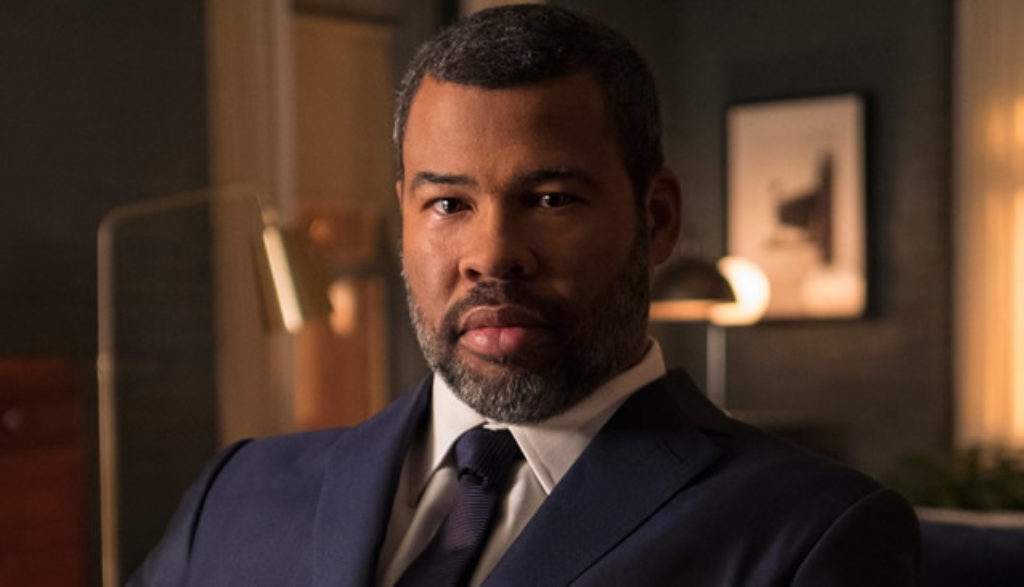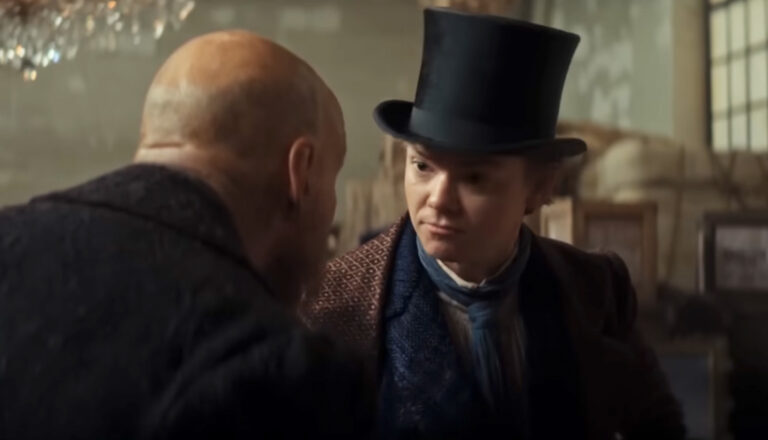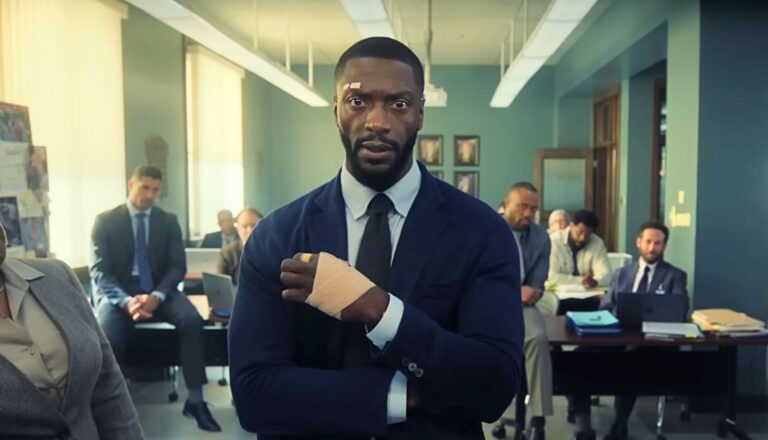
Unfamiliar
Filled with gritty violence and foul language, when it comes to this German spy drama, “unfamiliar” is how most viewers should stay.

Music: Da-da-da-da da-da-da-da …
Narrator: Welcome to a world in which the past never dies. A place where television shows that have come and gone do not just live on in our memories, but live again on our screens. It is a land of reboots and reimaginings, of bankrupt creativity, unadulterated cash grabs and, sometimes, well-crafted entertainment. These new old shows do not just reside in some fifth dimension beyond what is known to man, but here. And now. And it’s only appropriate that one such show to crawl out of its tomb to walk again is … The Twilight Zone.
Music: BA-ta-ba-ta-ba-bum!
CBS aired very first episode of the original Twilight Zone on Oct. 2, 1959. For five seasons, its creator, host and primary writer, Rod Serling, took viewers on tours of the impossible—from deep space to back in time to, sometimes, into the bowels of hell itself.
The anthology program was breathtaking in its ambition and variety: One episode might be good for a laugh, the next could render you sleepless for weeks. Few actors would appear twice on the show, even if Serling himself returned to some themes again and again. He loved political and social allegory. He was fascinated by the nature of time. He couldn’t resist old-fashioned Faustian bargains. And almost every episode offered a moral.
The Twilight Zone was never one of its era’s most popular shows. But Serling’s singular vision made it one of the best, as its pile of Emmys and its file of contemporary critical praise can attest. In fact, the show’s influence is perhaps unparalleled. Even people who’ve never watched an episode know its theme music and Serling’s clipped, characteristic intro. Contemporary series ranging from Star Trek to The X-Files to Black Mirror have tried to bottle some Twilight Zone lightning, and everyone from J.J. Abrams, Tim Burton, Stephen King and M. Night Shyamalan have pointed to the show as an influence.
But despite (or perhaps because of) the footprint it’s left in modern culture, The Twilight Zone’s shoes have been mighty hard to fill. Two Twilight Zone reboots have come and gone with nary a whisper. A 1983 movie was widely panned.
Now comes a third television attempt to recapture Serling’s magic. And this one may be the best—and worst—yet.
Jordan Peele, the one-time comedian now better known for his own brand of socially conscious sci-fi/horror fables (Us, Get Out), takes the helm for the latest reboot. For its first season, Peele marshalled a cadre of well-known talent to appear, including Adam Scott, Kumail Nanjiani and Seth Rogen. And the second season is set in much the same fashion with Tony Hale, Billy Porter and George Takei all lending their acting talents.
And CBS, instead of pushing The Twilight Zone to its broadcast channel, airs the program on its streaming service, CBS All Access. It’s a strange move, given the show’s buzzy bona fides. But for this strange show, perhaps it makes sense. CBS is better known these days, after all, as a home for reliable, predictable, cookie-cutter crime procedurals and inoffensive, forgettable comedies. Perhaps this online locale gives the show more opportunity to be, like its forerunner, original and cutting edge and flat-out weird.
And that it is … sort of.
If the new Twilight Zone isn’t original, that’s because it imitates its predecessor so effectively: its freaky storylines, its socio-political allegories, and yes, even its morals. This is a show that has something to say.
But it also says it problematically, too.
The new Twilight Zone captures the original’s vibe while making it more germane to a 21st-century audience But the anthology also dives into content that would’ve never flown in Serling’s day—nor even today on CBS proper, for that matter. While we don’t see any nudity (at least at this early juncture), we hear plenty of sexually explicit conversation, depending on the episode. And the show embraces the worst possible language, littering episodes with f- and s-words and richly earning its TV-M rating.
That’s incredibly disappointing, given the show’s earnest reverence for its predecessor. And, frankly, it’s a wholly unnecessary inclusion: Serling proved you could make a first-class, thought-provoking and deeply unsettling show without a whiff of content. This Twilight Zone has no such confidence.
The Twilight Zone delves into some grotesque levels of violence in some episodes. And to include so many profanities in its stories makes this a no-go zone for many. It’s a nightmare, even at 20,000 feet.
After lonely bachelor Phil discovers a telepathic connection with Annie, a woman in another city, he proves he is willing to do whatever it takes to meet her in person.
Phil tackles another man to the ground and punches him repeatedly until the man stops moving. He then kills him by smashing his head with a candlestick. Police tackle a man to the ground and throw him in a squad car. A woman arms herself with a knife in self defense. Annie tells Phil she is being chased by a strange man, and we later hear her scream. A woman plots to have her husband murdered.
Phil leers creepily at a woman in a café. He lovingly strokes a couch while talking to Annie and it is later implied that he masturbates. Phil and Annie make plans to kiss when they finally meet each other in person even though Annie is married. Phil answers his door in his underwear and a t-shirt.
Phil believes he is going crazy when he first hears Annie’s voice. However, when his counselor suggests Phil might have dissociative identity disorder, he scoffs and walks out of therapy. He also has an existential crisis, wondering what his purpose on Earth is.
People drink at restaurants and bars. Annie says her grandma’s eggnog pancakes got her entire family drunk. Phil and Annie talk about robbing banks. Someone talks about church bells. We hear multiple uses of the f-word and s-word. There are uses of “h—,” “a–hole,” “d–n” and “b–ch.” God’s name is misused several times, sometimes paired with the expletive “d–n.”
A comedian is supposed to be funny. Samir Wassan is not. Night after night, he tries to draw laughs by lecturing his audience about the Second Amendment. “Maybe you should put some jokes in there,” a fellow comic suggests. Samir’s act changes when a legendary jokester tells him to forget about politics and make his comedy personal. But the advice comes with a word of caution: “Once [your audience] connects to it, it’s theirs. And once it’s theirs, it’s gone forever.” It turns out to be all too true.
Samir’s sets become vanishing acts, making whoever he talks about disappear—as if they never existed. When he discovers what’s happening, Samir tries to tell himself that he’s not killing anyone, that he’s using his power for good by making some truly terrible people in his life vanish forever. (We learn that a fellow comic killed two people in a drunk-driving accident. And when Samir talks him out of existence, he knows that the mother and child who died in the accident are alive again.) But Samir’s eventually confronted by his own selfishness and talks himself out of existence—literally dropping the mic on his way out.
The episode is deeply Faustian. (The advice-giving comic vapes, and the steam even wreathes around the man’s face like infernal smoke.) But it’s also quite ribald. A rival lesbian comic frequently jokes about sex and her own private parts, both in her act and in conversation. She kisses Samir, telling him that if she was straight, she’d sometimes sleep with him “out of respect for your comedy.” (Samir kisses his girlfriend sometimes as well.) We hear references to male body parts, too. A man sexually harasses a waitress. We hear references to many misdeeds committed by others, including rape, pedophilia and murder. Samir insinuates that his girlfriend’s mentor (whom she sometimes has dinner with alone) has untoward intentions toward her.
A comedian jokes that asterisks inserted into swear words are the “chastity belt” of language, but we’re going to resort to a few here. We hear at least 22 uses of the f-word, another 16 of the s-word and lots of other profanities, including “a–,” “b–ch”, “d–n” and “h—.” God’s name is misused four times. We see people drink wine, beer and liquor, and Samir asks for something “cheap and brown, no ice.” He makes a joke about his dog urinating on his pizza. We hear some political jokes, including how the current president is a “fascist”.

Paul Asay has been part of the Plugged In staff since 2007, watching and reviewing roughly 15 quintillion movies and television shows. He’s written for a number of other publications, too, including Time, The Washington Post and Christianity Today. The author of several books, Paul loves to find spirituality in unexpected places, including popular entertainment, and he loves all things superhero. His vices include James Bond films, Mountain Dew and terrible B-grade movies. He’s married, has two children and a neurotic dog, runs marathons on occasion and hopes to someday own his own tuxedo. Feel free to follow him on Twitter @AsayPaul.

Emily studied film and writing when she was in college. And when she isn’t being way too competitive while playing board games, she enjoys food, sleep, and geeking out with her husband indulging in their “nerdoms,” which is the collective fan cultures of everything they love, such as Star Wars, Star Trek, Stargate and Lord of the Rings.

Filled with gritty violence and foul language, when it comes to this German spy drama, “unfamiliar” is how most viewers should stay.

Oliver Twist’s Artful Dodger isn’t 13 anymore: He’s an adult. And being an adult comes with more grown-up problems.

Though it’s compelling, the content concerns in Prime Video’s ‘Cross’ might be enough to cross it off your watch list.

‘The ‘Burbs’ is Peacock’s attempt to adapt the 1989 movie of the same name. But a fresh coat of paint doesn’t hide the content issues.